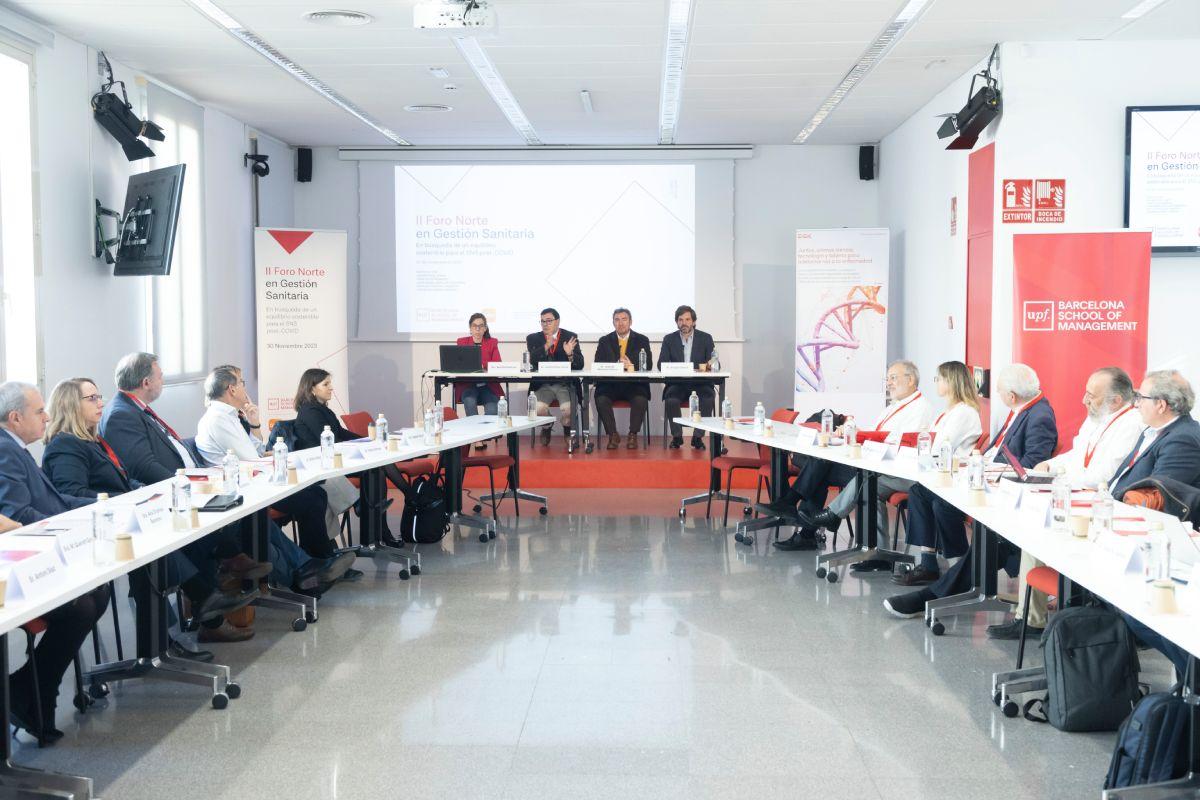Experts in Healthcare Management discuss the main challenges of the National Health System (NHS) in the second edition of the NORTE Forum
14 Diciembre - 2023
Leading experts in healthcare management shared their perspective and insights in two discussion panels that focused on ‘Imbalances in the Financing, Organization and Management of the NHS’ and ‘Financing Models and Prices for Innovative Services’
The UPF Barcelona School of Management (UPF-BSM) has once again hosted the NORTE Forum, an event organized within the framework of the biopharmaceutical company GSK’s Chair in Regional Economic Opportunities and Challenges in Healthcare Management. The event brought together acclaimed academics, health professionals and representatives from public and private sector institutions. The objective of the event is to discuss the emerging challenges and opportunities in healthcare management and the post-Covid financing model.
The NORTE Forum was inaugurated by the Director General of the UPF-BSM, José Manuel Martínez Sierra, who emphasized “the importance of hosting a leading event for experts, companies, students and researchers, which strives to boost the wellbeing of and find solutions for public health”.
During the introduction to the forum, the directors of the Chair, Jaume Puig-Junoy and Natàlia Pascual, highlighted the importance of public-private collaboration as a key driving force of knowledge and innovation.
The first discussion panel was entitled ‘Imbalances and Sustainability in the Financing, Organization and Management of the NHS’ and was chaired by Professor Juan Oliva Moreno from the Universidad de Castilla la Mancha. In the first presentation, entitled ‘Imbalances and necessary reforms in primary care’, the President of CAMFiC, Dr. Antoni Sisó, explained that “when primary care cannot perform its function properly, it hinders the diagnosis of chronic illnesses”. In this respect, he highlighted that one side effect of the COVID-19 pandemic was a drop of between 35% and 60% in diagnoses of cancers and other chronic diseases.
According to Professor José Maria Abellán from the Universidad de Murcia, in his presentation ‘Imbalances and budgetary requirements of the NHS’, “we have to ask ourselves what will happen if the non-financial resources stop growing at a similar rate or even faster than the growth in healthcare spending”. After a review of the different indicators of the health budget, he insisted that the challenge of financing the National Health System “is not exclusively a budget challenge, but rather it requires organization, management, evaluation and planning”.
Next, the Vice-President of the Fisabio Foundation in Valencia, Ricard Meneu, in his presentation entitled ‘The essential reconfiguration of the institutional framework of the NHS’, underlined the need to “make the National Health System assimilate what is usual in all other organizations and companies with respect to management, contracting, services and evaluation”. To make this possible, he advocated making progress in terms of “redesigning public institutions”.
The second discussion panel at the forum was entitled ‘Lessons from the Recent National and International Experience for the Current Financing Model and Prices for Innovative Service’. Chaired by Professor José Maria Abellán, the session focused on the model for incorporating innovative drugs.
In a presentation entitled ‘Review and evaluation of policy options for improving access to combination therapies in oncology in Europe”, Jorge Mestre, an independent consultant, Associate Professor at the Universidad Carlos III and visiting professor at the UPF-BSM, emphasized that “we often find ourselves with a standard, a widely used and financed therapy that already exists, and then an additional therapy that may have been developed and introduced to the market as independent or joint monotherapy”. Therefore, one of the big challenges that Mestre highlighted is “attributing the total value of the two therapies”. However, he remarked that “investment must also be based on efficacy and, as such, counties need up-to-date, reliable databases in order to weigh up their investment decisions”.
In her presentation ‘Drug policy: recommendations and realities’, Marta Trapero, a Professor from the Universitat de Lleida, and visiting professor at the UPF-BSM, discussed “the lack of a strategic plan, governance, procedure and legislative support”. Trapero explained that “technicians feel really unsupported when making decisions without an accepted framework of financing procedures”. With this in mind, she also advocated the idea of the transparency required throughout operations in both the private and public sector.
Lastly, in his presentation ‘Two years of economic evaluation in Therapeutic Positioning Reports: What have we learned? Methodological aspects and organizational proposals’, Professor Juan Oliva from the Universidad de Castilla la Mancha and expert in economics, politics and health, underlined the need to “finance and use what is efficient rather than only effective” from a social perspective. Oliva remarked that “the efficiency dimension and the good use and management of public resources has been enshrined in our general regulations since the Constitution was established”.
The general consensus among the participants was the importance of interdisciplinary collaboration between the public and private sectors to tackle the challenges of Healthcare Management, as well as the efficient incorporation of innovation as a fundamental driving force for tackling regional and economic challenges now and in the future.
By holding this second edition of the NORTE Forum, which was attended by around thirty experts, academics and public and private managers, the UPF-BSM has reaffirmed its commitment to academic excellence and the promotion of discussions that foster knowledge and transfer and the implementation of effective solutions in the field of Healthcare Management.
